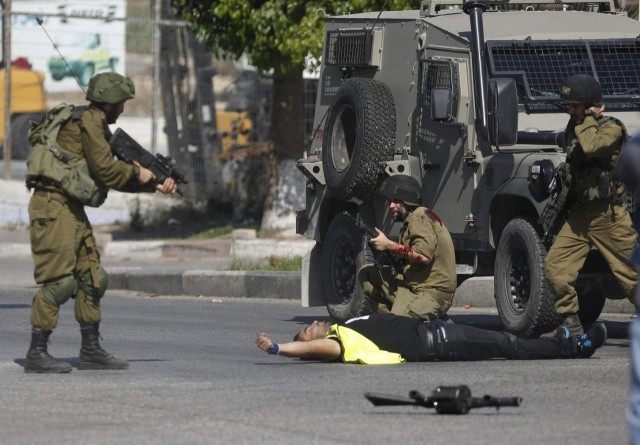TEL AVIV – While Israel was still reeling from an incident in which an IDF soldier shot an immobilized terrorist in the head, four commanders from the army’s elite Givati Brigade opened up to Ynet news about the shooting and the challenges of the past six months of Palestinian violence targeting Israelis.
“It is an unethical and extremist act, and we don’t train our soldiers to act that way,” said Lt. Col. Kobi Barel, a battalion commander who was previously in charge of the same area where the Hebron shooting occurred. “There were hundreds of similar cases and we did not see results like that happening. A scene like that draws fire, media, and crowds. That is why the scene needs to be closed off, isolated and the body cleared away as fast as possible.”
The commander continued by explaining how terrorists are interdicted.
Palestinians stand behind red lines we draw on the ground, they are checked from there in order to maintain a safe distance from the soldiers. That way a terrorist who attacks with a drawn knife has no advantage. Our soldiers took their positions after short training sessions in krav maga [an Israeli martial art] and shooting drills. We called this warming up before a mission, this strengthened and sharpened our infantrymen.
According to the testimonies of Kfir Brigade soldiers, the soldier “fired emotionally” after telling the platoon commander and his friend that “we should kill the terrorist who stabbed my friend.”
Over the past year, the IDF has implemented policies to protect the Palestinian population’s day-to-day life despite the upsurge in attacks.
“The battalions entirely revamped their approach to … keeping law and order. We put borders in conflict areas,” Barel said.
The Rotem battalion’s commander, Lt. Col. Liron Betito, experienced this firsthand. After an attack in his area in which the Henkin couple were murdered on an Israeli settlement – which kicked off the current round of violence – he sent forces to protect the Palestinian’s annual olive harvest near the settlement area. “We grew white hairs after that,” admitted Lt. Col. Betito. “We operated with a clear policy – the Palestinians harvest olives until the last tree – and this created friction.”
Meanwhile, Lt. Col. Nir Ben Hamo said that settlers who tried to disrupt everyday Palestinian life “in a way that could fan the fire” were arrested.
“We did not allow innocents to get hurt,” he said.
Lt. Col. Betito recalls an incident in which Jewish worshipers snuck into Joseph’s Tomb in Nablus at night, during the peak of the incitement.
At 2am I was alerted because worshipers entered Joseph’s tomb in a vehicle. We quickly drove over there with what we had, just four vehicles. At the entrance to Nablus we were stopped by a Palestinian police checkpoint. They refused to let us pass. After talking to them we crossed the checkpoint and proceeded to the tomb.
Betito said there were hundreds of Palestinians gathered around five Jews, and armed Palestinian police officers were aiming their weapons at his soldiers. “I immediately recognized the senior Palestinian police officer in the area. We calmed the situation down, but it was surreal. Eventually we safely rescued the worshipers,” he concluded.
The commander of the Shaked battalion, Lt. Col Eyal Schwimmer, told Ynet about a shooting attack at a checkpoint at the entrance to Ramallah in which two Shaked infantrymen were wounded.
The Palestinian Authority agent drew his pistol from his vehicle, a pistol instead of his ID, and fired five bullets at them. He continued to drive towards Beit El. The event ended when soldiers who were injured in addition to another soldier at the checkpoint fired towards him despite their injuries and killed him. We are talking about soldiers in the training platoon, they were barely nine months in the military.
The less success the lone wolves have, the fewer copycat attacks will happen. The easiest thing is to close off areas, but restraint is strength. We also allowed the fabric of life in Hebron to continue and no Palestinian stores were closed after the attacks. Another Defensive Shield [a large-scale military operation in 2002 at the height of the Second Intifada] is not relevant at this time.
However, the battalion commanders reject claims that they are soft when it comes to targeting terrorists.
“When a terrorist comes to attack a soldier or citizen, the infantryman must immediately neutralize him. During disturbances it is different, and it should be handled with no fatalities on the other side,” Lt. Ben Hamo said.
Lt. Col. Barel said, “We encountered many incidents that could have ended up with dead Palestinians but it was still within the rules of engagement.”

COMMENTS
Please let us know if you're having issues with commenting.